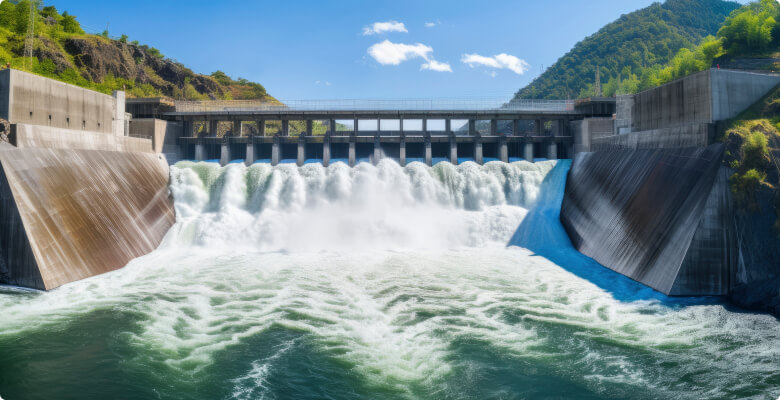Enhancing Water Management: The Vital Role of Water Pumps in Efficient Water Utilization
2024.05.10
The Importance of Water Pumps in Water Managing
Water is the sustenance of life. However, access to it is not always straightforward or guaranteed. This is where the genius of human ingenuity, particularly water pumps, plays a crucial role in managing and enhancing our water resources. This discussion will not only highlight the importance of water pumps in our quest for water accessibility but will also delve into their mechanism, showcase their applications through examples, and touch upon the contributions of the LEO pumps project in water conservancy.
Understanding Water Pumps for Water Management
Water pumps are instrumental in the movement of water from sources often inaccessible or unsuitable for direct use to places where it is needed. They are essential in managing water resources for various purposes, including domestic, agricultural, and industrial use. These mechanical devices ensure a consistent water supply to our homes, farms, and factories, making a significant contribution to water resource utilization.
The various types of water pumps and their specialized capabilities enable targeted applications, meeting specific needs arising from different water sources and supply demands. Their significance lies in optimizing water resource usage, improving efficiency, and ensuring reliable access to this essential resource across various sectors.
Water pumps work on the basic principle of converting mechanical energy into hydraulic energy. This conversion facilitates the movement of water against gravity, over long distances, or through filtration systems, making water from under the ground, rivers, or lakes accessible and usable. This ability to efficiently move and manage water underlies the critical role pumps play in water resource enhancement.

Water Pumps Usage in Enhancing Water Resources
Water pumps have an extensive range of applications that make them invaluable in water conservancy. Here are some common types of water pumps and their applications in various contexts. These pumps, along with advanced technologies such as variable speed drives, remote monitoring, and automation systems, play a significant role in promoting efficient water management, sustainable resource utilization, and the success of large-scale water projects.
Let's explore some of the key areas where these pumps play a vital role:
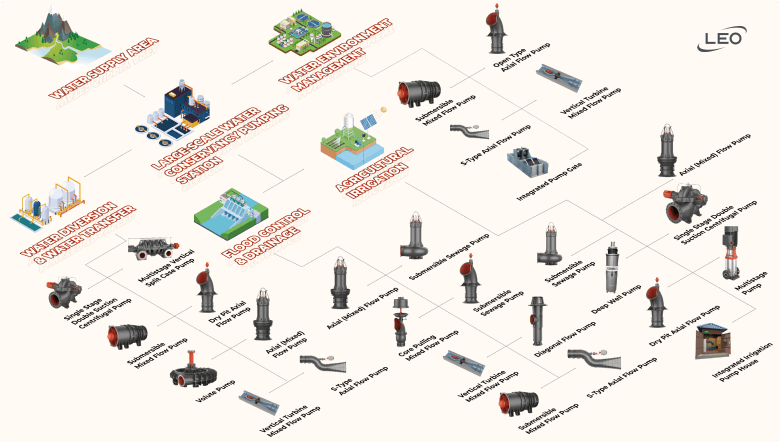
Notes: It is a map to assist you in understanding those water applications with LEO pumps.
1. Water Diversion and Water Transfer
Water pumps are crucial for diverting water from its natural course or transferring it from one location to another. In areas where water sources are scarce or unevenly distributed, pumps help transport water to where it's needed most, ensuring a steady supply for communities, industries, and agriculture. For example, in regions with significant variations in rainfall, pumps facilitate the transfer of water from surplus areas to those experiencing drought, mitigating water shortages and supporting sustainable development.
2. Water Environment Management
Water pumps play a vital role in managing water environments by regulating water levels in lakes, rivers, and reservoirs. They help maintain ecological balance, prevent water stagnation, and support aquatic life by ensuring adequate oxygen levels and controlling pollution. In wastewater treatment plants, pumps are indispensable for conveying sewage and effluent for purification, safeguarding public health and protecting natural ecosystems from contamination.
3. Flood Control and Drainage
During periods of heavy rainfall or storm surges, water pumps are essential for flood control and drainage systems. They remove excess water from urban areas, agricultural fields, and low-lying regions, minimizing the risk of flooding and preventing property damage, infrastructure disruption, and loss of life. Pumps are deployed in pumping stations and flood barriers to swiftly evacuate water and redirect it to designated drainage channels or reservoirs, safeguarding communities from the devastating impacts of floods.
4. Agricultural Irrigation
Agricultural irrigation relies heavily on water pumps to supply water for crop cultivation, especially in arid and semi-arid regions where rainfall is insufficient. Pumps draw water from natural sources such as rivers, wells, and reservoirs and distribute it through irrigation networks to fields, orchards, and vineyards, ensuring optimal soil moisture levels for plant growth and maximizing crop yields. By enhancing agricultural productivity and food security, water pumps play a pivotal role in sustaining livelihoods and supporting rural economies worldwide.
The use of water pumps has been a game-changer in how we manage our most precious resource. By enabling precise control over water distribution, reducing wastage, and ensuring that clean water reaches every corner of our lives, pumps have become indispensable.
Case Studies and Impact
Large-scale Water Conservancy Pumping Station

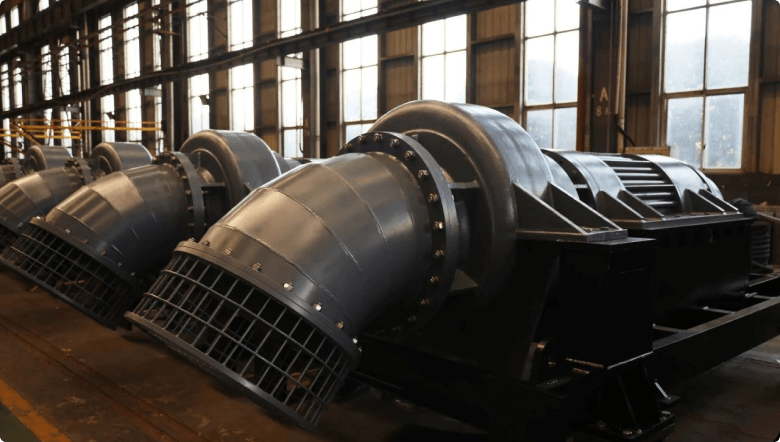
Project: Jinghui Canal (Zhengguo Canal) irrigation area
Product: WQ series submersible sewage pumps
LEO has played a crucial role in supporting the modernization and ongoing development of the historic Jinghui Canal (Zhengguo Canal) irrigation area in 2022. Specifically, LEO has been involved in the renovation and upgrading project of the West Suburb Reservoir (Phase I) Pumping Station. The Jinghui Canal, a significant part of the ancient Zhengguo Canal dating back over 2200 years to 246 BC, stands as one of China's three major ancient water conservancy projects, benefiting 1.2 million people. LEO has contributed to this project by providing its independently developed efficient WQ series submersible sewage pumps, renowned for their high efficiency, energy savings, unclogging capabilities, reliability, stability, anti-tangling features, automatic protection, and control.
The renovation and upgrading project has resulted in enhanced water pump efficiency, with a single-machine flow rate now ranging from 0.8m³/s to 1.32m³/s within the efficient range and a lift range from 24m to 13.2m. These improvements ensure an efficiency of over 80%, meeting the high-efficiency energy-saving requirements. These enhancements have significantly improved the performance of water facilities in the Jinghui Canal irrigation area, offering more reliable and efficient solutions for irrigation and sewage disposal. This, in turn, promotes the rational utilization of local water resources and fosters sustainable development.
Flood Control and Drainage

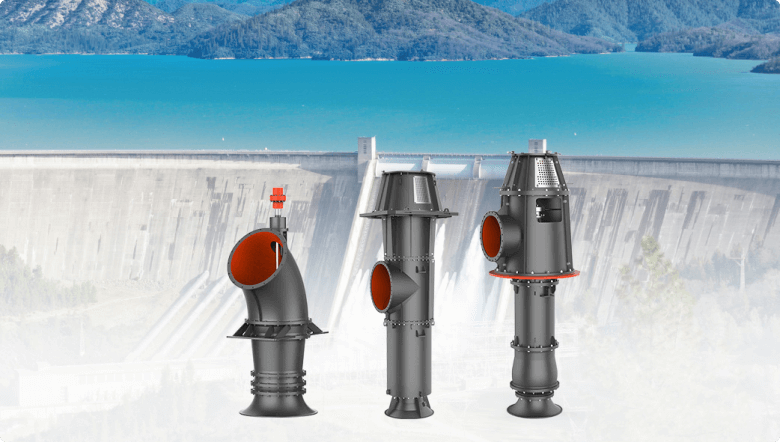
Project: Taihu Lake Embankment
Product: ZLB vertical axial flow pump
LEO is proud to be a part of the Taihu Lake Embankment Project of China, providing tailored pump and system solutions to enhance flood protection in the region. Our 1750ZLBK10-2.20 vertical axial flow pump, with its high efficiency and energy conservation features, is designed to meet once-in-a-century flood protection standards. Equipped with the LEO Smart Pump System, it ensures automatic monitoring and eco-friendly, energy-efficient operation.
Water Diversion and Water Transfer
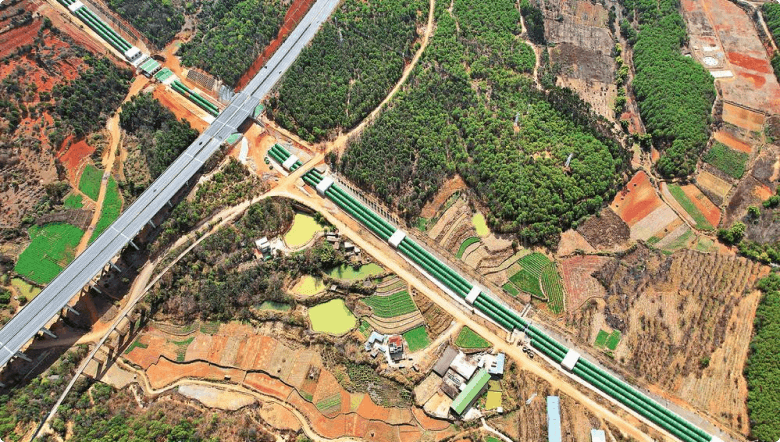
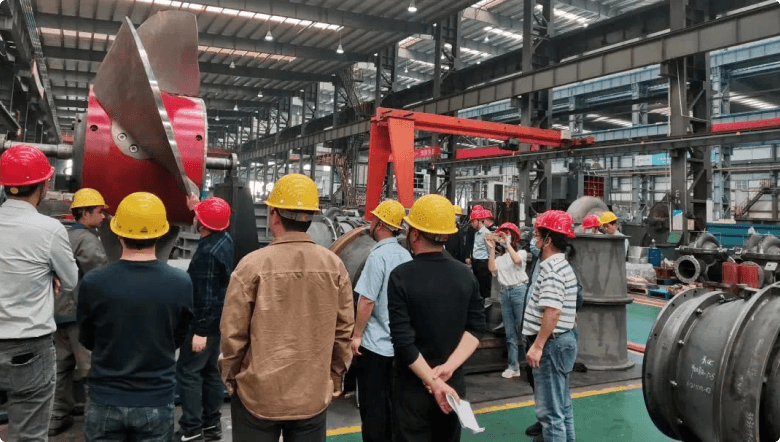
Project: Yunnan Dianzhong Water Diversion
Product: Horizontal multi-stage split case centrifugal pump 500DS-85X6D-4 & horizontal single-stage centrifugal pump GSX200-655M
This project aims to address industrial water supply, water supply for industrial park towns, domestic and livestock water supply in rural areas, and agricultural irrigation water supply. The intake flow rate at the canal head is Q=1.93m³/s, with an annual drinking water volume of 31.876 million m³. The overall project layout includes three water pumping stations: the intake pumping station, the Shilongba pumping station, and the Zhaipai pumping station, with a total installed capacity of approximately 13,625 kW.
Conclusion
Water pumps are essential for water management and greatly enhance our convenience and well-being. Advancements in technology have led to more energy-efficient and eco-friendly pumps. As we work towards maximizing water efficiency and preserving this vital resource, water pumps will continue to be crucial in meeting our current and future water requirements.
Hot Media


LEO at Big 5 Global ...
2025.11.27

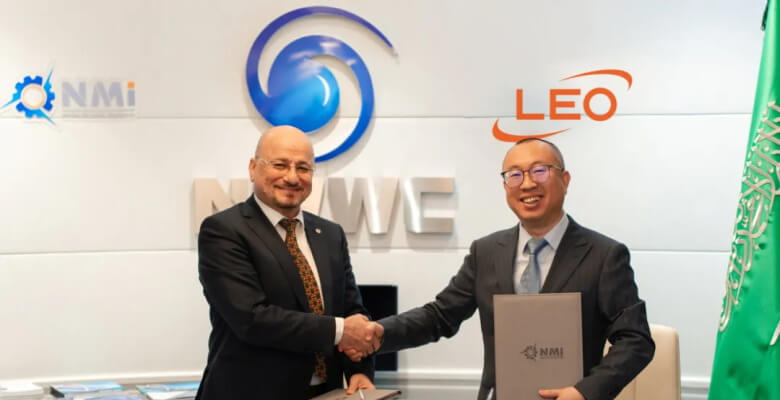
A Landmark LEO–Al Mo...
2025.12.02


LEO at the 138th Can...
2025.10.22


LEO Pro-Bono Water S...
2025.08.15

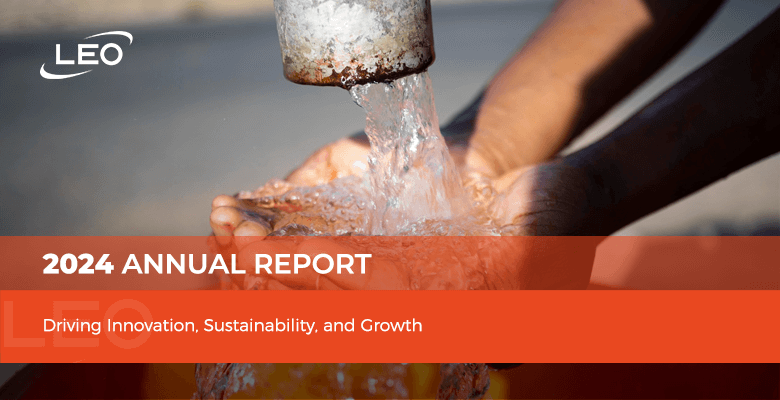
LEO PUMP 2024 Annual...
2025.05.14


A New Journey, A New...
2025.03.18


30 Years of LEO: lea...
2025.01.06


LEO at 30: United Th...
2024.12.16


A New Journey, A New...
2024.11.21


Showcasing Innovatio...
2024.10.25


LEO “Growing Forward...
2024.07.19

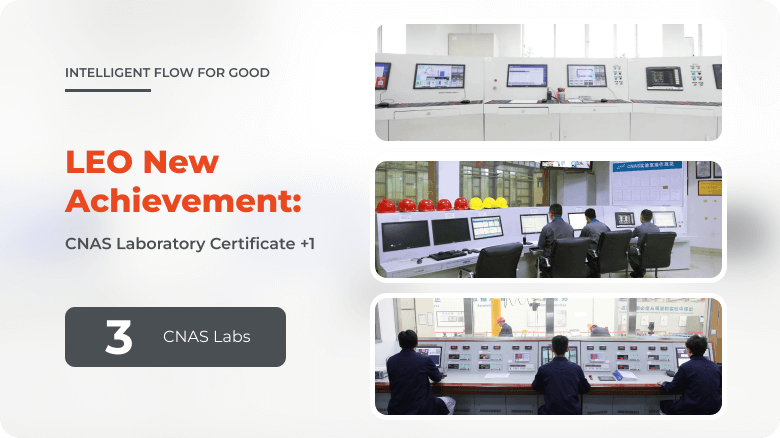
LEO Expands Global Q...
2024.09.06


LEO in Action: Power...
2024.08.02

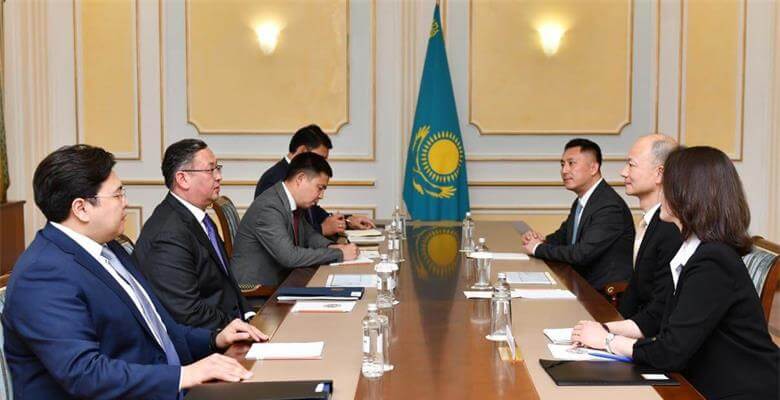
LEO Event Highlight ...
2024.06.07


LEO PUMP at IFAT Mun...
2024.04.28


LEO PUMP at 135th Ca...
2024.04.01


LEO PUMP at MCE 2024...
2024.03.06


LEO PUMP at Big 5 Co...
2024.02.20


LEO PUMP at THE BIG ...
2023.11.16


LEO's Key Role in Wi...
2023.11.04

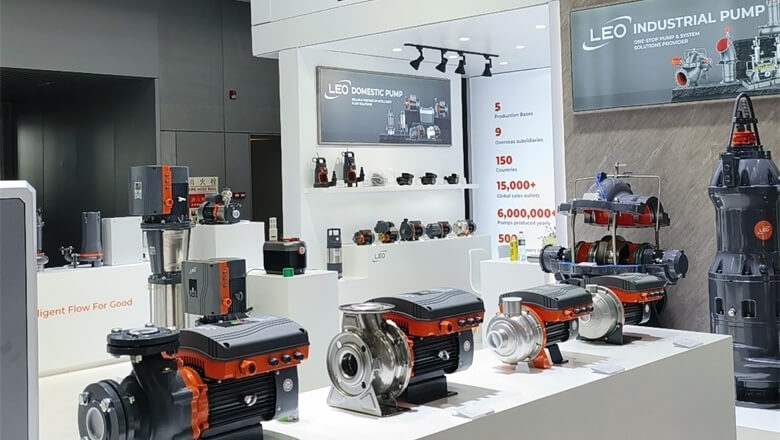
LEO at 134th Canton ...
2023.10.18

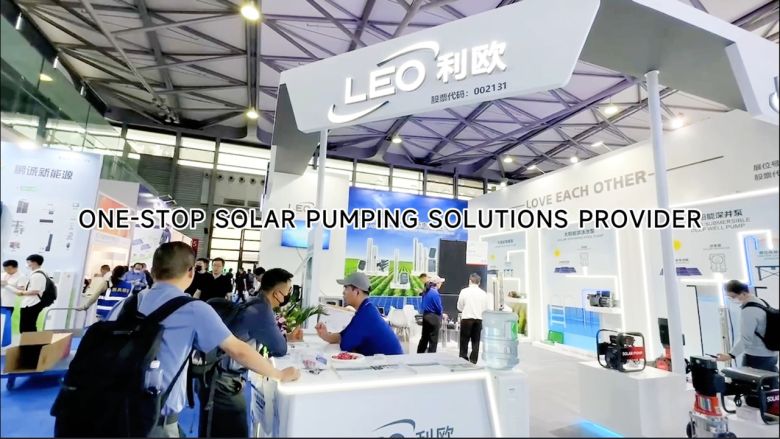
LEO PUMP at SNEC PV ...
2023.06.02


LEO Solution of Wate...
2022.09.28

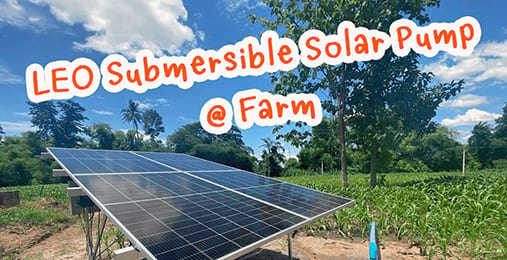
LEO Project - Solar ...
2022.08.31


LEO Flagship Showroo...
2022.06.28


LEO Project on Power...
2022.06.22

